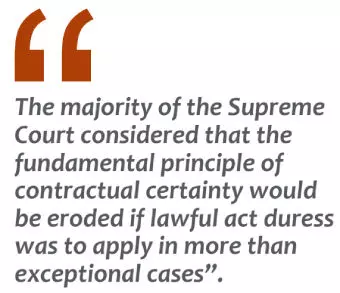- Home
- News
- Articles+
- Aerospace
- Artificial Intelligence
- Agriculture
- Alternate Dispute Resolution
- Arbitration & Mediation
- Banking and Finance
- Bankruptcy
- Book Review
- Bribery & Corruption
- Commercial Litigation
- Competition Law
- Conference Reports
- Consumer Products
- Contract
- Corporate Governance
- Corporate Law
- Covid-19
- Cryptocurrency
- Cybersecurity
- Data Protection
- Defence
- Digital Economy
- E-commerce
- Employment Law
- Energy and Natural Resources
- Entertainment and Sports Law
- Environmental Law
- Environmental, Social, and Governance
- Foreign Direct Investment
- Food and Beverage
- Gaming
- Health Care
- IBC Diaries
- In Focus
- Inclusion & Diversity
- Insurance Law
- Intellectual Property
- International Law
- IP & Tech Era
- Know the Law
- Labour Laws
- Law & Policy and Regulation
- Litigation
- Litigation Funding
- Manufacturing
- Mergers & Acquisitions
- NFTs
- Privacy
- Private Equity
- Project Finance
- Real Estate
- Risk and Compliance
- Student Corner
- Take On Board
- Tax
- Technology Media and Telecom
- Tributes
- Viewpoint
- Zoom In
- Law Firms
- In-House
- Rankings
- E-Magazine
- Legal Era TV
- Events
- Middle East
- Africa
- News
- Articles
- Aerospace
- Artificial Intelligence
- Agriculture
- Alternate Dispute Resolution
- Arbitration & Mediation
- Banking and Finance
- Bankruptcy
- Book Review
- Bribery & Corruption
- Commercial Litigation
- Competition Law
- Conference Reports
- Consumer Products
- Contract
- Corporate Governance
- Corporate Law
- Covid-19
- Cryptocurrency
- Cybersecurity
- Data Protection
- Defence
- Digital Economy
- E-commerce
- Employment Law
- Energy and Natural Resources
- Entertainment and Sports Law
- Environmental Law
- Environmental, Social, and Governance
- Foreign Direct Investment
- Food and Beverage
- Gaming
- Health Care
- IBC Diaries
- In Focus
- Inclusion & Diversity
- Insurance Law
- Intellectual Property
- International Law
- IP & Tech Era
- Know the Law
- Labour Laws
- Law & Policy and Regulation
- Litigation
- Litigation Funding
- Manufacturing
- Mergers & Acquisitions
- NFTs
- Privacy
- Private Equity
- Project Finance
- Real Estate
- Risk and Compliance
- Student Corner
- Take On Board
- Tax
- Technology Media and Telecom
- Tributes
- Viewpoint
- Zoom In
- Law Firms
- In-House
- Rankings
- E-Magazine
- Legal Era TV
- Events
- Middle East
- Africa

Lawful Act Duress Claims - All but Grounded?
Lawful Act Duress Claims - All but Grounded?

LAWFUL ACT DURESS CLAIMS - ALL BUT GROUNDED? Following the recent UK Supreme Court judgment in Pakistan International Airlines Corporation v Times Travel (UK) Ltd, arguments founded on lawful act duress will be difficult to get off the ground. The principle of unlawful act economic duress is well established in English law. A threat of violence or a threat to breach a contract, for...
To Read the Full Story, Subscribe to Legal Era News
Access Exclusive Legal Era Stories, Editorial Insights, and Expert Opinion.
Already a subscriber? Sign in Now
LAWFUL ACT DURESS CLAIMS - ALL BUT GROUNDED?
Following the recent UK Supreme Court judgment in Pakistan International Airlines Corporation v Times Travel (UK) Ltd, arguments founded on lawful act duress will be difficult to get off the ground.
The principle of unlawful act economic duress is well established in English law. A threat of violence or a threat to breach a contract, for example, to coerce a party to agree to a contract variation on unfavorable terms, is likely to be the basis for unlawful act economic duress. Providing that the party which is on the receiving end of the duress acts reasonably promptly, the contract may be voidable.
But what about a situation where a party uses a threat of a lawful act to apply pressure? Would this also constitute economic duress?
These questions have been addressed by the UK Supreme Court in its recent judgment in Pakistan International Airlines Corporation v Times Travel (UK) Ltd. In summary, whilst the existence of lawful act duress is acknowledged, the Supreme Court has confined its application to extremely limited circumstances. In practice, following this judgment, the threshold to establish lawful act duress is high.

Background
The facts of the case before the Supreme Court are straightforward. In around 2006, Pakistan International Airlines Corporation (PIAC) appointed Times Travel (UK) Ltd (TT) as a sales agent for tickets on its flights. PIAC was, at that time, the only airline offering direct flights between London and Pakistan. TT was a small family-owned company that specialized in flights from the UK to Pakistan. Its business was built on what was termed in the Supreme Court's judgment as "almost exclusive reliance on PIAC".
In 2012, when a dispute arose between TT and PIAC in relation to commission allegedly payable to TT on past sales, PIAC informed TT that, in order to continue its relationship with PIAC, TT would need to waive its claim for unpaid commission. PIAC served notice to terminate the old agreement and the new contract, which TT signed in 2012, included a clause that TT would waive its claims to historic commission. PIAC's position was that it was not under any obligation to enter into a new contract with TT.
In 2014, TT commenced proceedings against PIAC claiming that the new agreement (and therefore the waiver) were voidable on grounds of economic duress. TT argued that it had been pressurized by PIAC to waive its claim for historic unpaid commission under the threat that, if it did not do so, PIAC would not enter into a new contract with TT. TT argued that it should not be bound by its waiver on the basis that it had, at the time the waiver was given, no realistic commercial alternative other than to agree.
The questions before the Supreme Court were:
1. What needs to be shown where a party seeks to set aside a contract on the ground that it was entered into under duress?
2. Must the conduct said to amount to duress have been unlawful?
3. If not, what are the criteria for establishing whether or not duress existed?
Key aspects of the decision
At first instance, the High Court found in favor of TT but this was overturned by the Court of Appeal on the basis that lawful act duress, whilst recognized as a doctrine, could not encompass a situation where the defendant uses lawful pressure to accomplish an objective to which it believes, in good faith, it is so entitled. The Supreme Court upheld the Court of Appeal's decision, albeit on a different rationale.
The Supreme Court recognized that the doctrine of lawful act duress arose out of the equitable principle of undue influence. It unanimously agreed that lawful act duress exists where pressure is exerted (or a lawful threat is made) that is illegitimate which causes the claimant to enter into the contract in circumstances where the claimant had no reasonable alternative but to give in to threat or pressure.
The majority of the Supreme Court Judges considered that PIAC's behavior could not be regarded as unconscionable behavior and that the courts should approach any extension of the doctrine of lawful act duress "with caution". In fact, only two circumstances were identified as examples of where lawful act duress had been applied:
1. Where the defendant used knowledge of criminal activity by the claimant; and
2. Where the defendant used illegitimate means to maneuver the claimant into a position of weakness in order to force it to waive its claim.
Whilst it is not the case that these are the only circumstances where lawful act duress may apply, the Supreme Court made it clear that a restrictive approach should be taken such that claims succeed only in exceptional cases. In particular, Lord Hodge's judgment underlines the already established principle that English Courts will not generally interfere in contracts or look behind the bargains agreed between the parties. It also reinforces what English lawyers already know: parties looking to argue the existence of implied terms generally face an uphill struggle.
Lord Burrows gave a lengthy judgment addressing the question of when a threat of pressure would be considered illegitimate. Lord Burrows reasoned that lawful act duress should apply in circumstances where a party acted in bad faith (such that the party does not genuinely believe it is entitled to what it is demanding). This was rejected by the majority on the basis that distinguishing instances of bad faith from situations where a party merely seeks to rely upon their own commercial advantage would be fraught with difficulty. The majority of the Supreme Court considered that the fundamental principle of contractual certainty would be eroded if lawful act duress was to apply in more than exceptional cases.

Conclusion
The Supreme Court judgment will no doubt be disappointing news to parties who find themselves on the wrong side of commercial relationships where unequal bargaining positions are at play. It is clear that claims founded on lawful act duress will now be difficult to win, given the judgment's recognition that "Discreditable behavior can be a feature of commercial activity".
On the other hand, the Supreme Court has commendably upheld well-established principles of certainty of contract and reconfirmed the English Courts' unwillingness to redraw the bargains agreed between parties. It will reassure parties looking to assert their commercial advantage that they will not find their contracts torn up by the courts further down the line in response to allegations of lawful act duress.
Disclaimer – The views expressed in this article are the personal views of the authors and are purely informative in nature.


